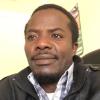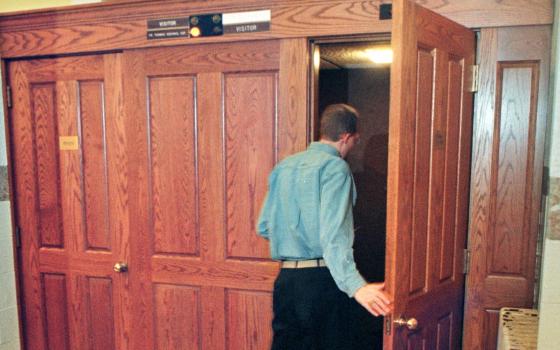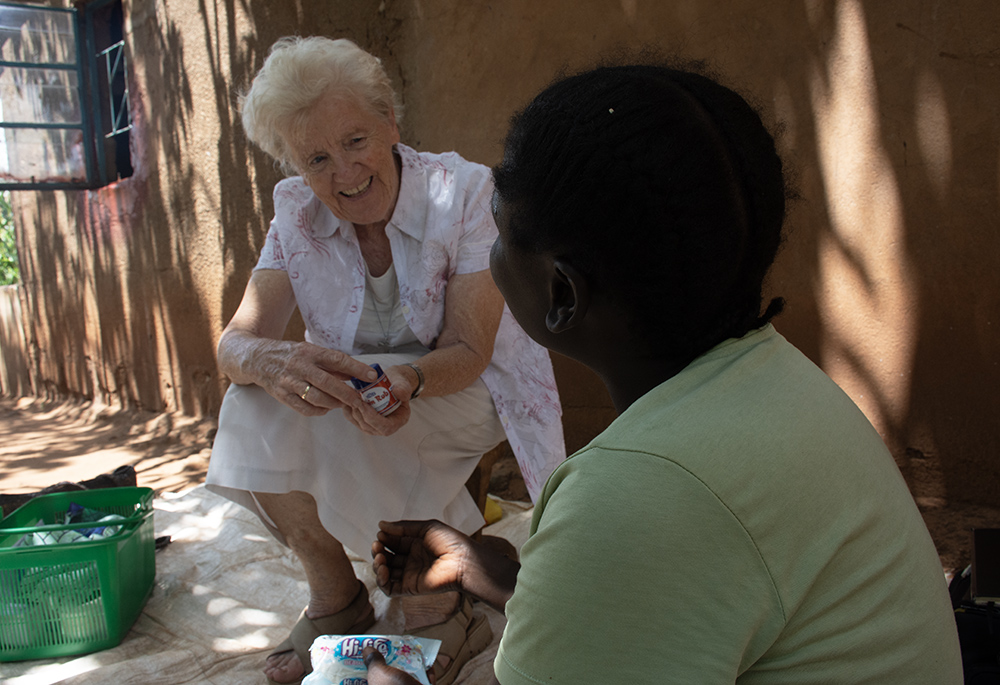
Sr. Mary Courtney visits a patient. Courtney is a member of the Franciscan Missionary Sisters for Africa. (Derrick Silimina)
For over 30 years, Sr. Mary Courtney, a member of the Franciscan Missionary Sisters for Africa, has provided crucial support to people with HIV/AIDS.
A native of Ireland, Courtney, 84, is a coordinator at the St. Francis Community Integrated Care Programme in the heart of Livingstone. She entered the novitiate in Boston in 1964 and professed her final vows in May 1972. She then went to Mater Infirmorum Hospital in Belfast to complete her registered nursing training and Dublin for midwifery training. Her missionary work has taken her to Uganda, Ethiopia and Zambia.
Zambia has a challenging history with HIV/AIDS, and Courtney's fight against the disease has made a difference in the lives of many. She spoke about the 1990s when patients were bedridden and stigmatized. Today, antiretroviral drugs enable patients to lead normal lives with a significant reduction in stigma and an increase in patient confidence.
Courtney oversees programs for those on antiretroviral drugs, intellectually disabled individuals and adolescents. She also works with patients living with mental health issues, epilepsy, tuberculosis and cancer.
GSR: Kindly tell us about your work and ministry.
Courtney: My humanitarian work is driven by prayer, community support, and a desire to show love and service to the most vulnerable in society. I have been in Livingstone since 1994, and my first assignment was working for a home-based care program, which at that time had many HIV/AIDS [patients].
After the introduction of antiretroviral treatment, the needs of the people changed, and the face of home-based care changed as well, from purely home-based care to the inclusion of the economic empowerment aspect. As a result, the organization changed [its] name from St. Francis Home Based Care to St. Francis Community Integrated Care Programme.
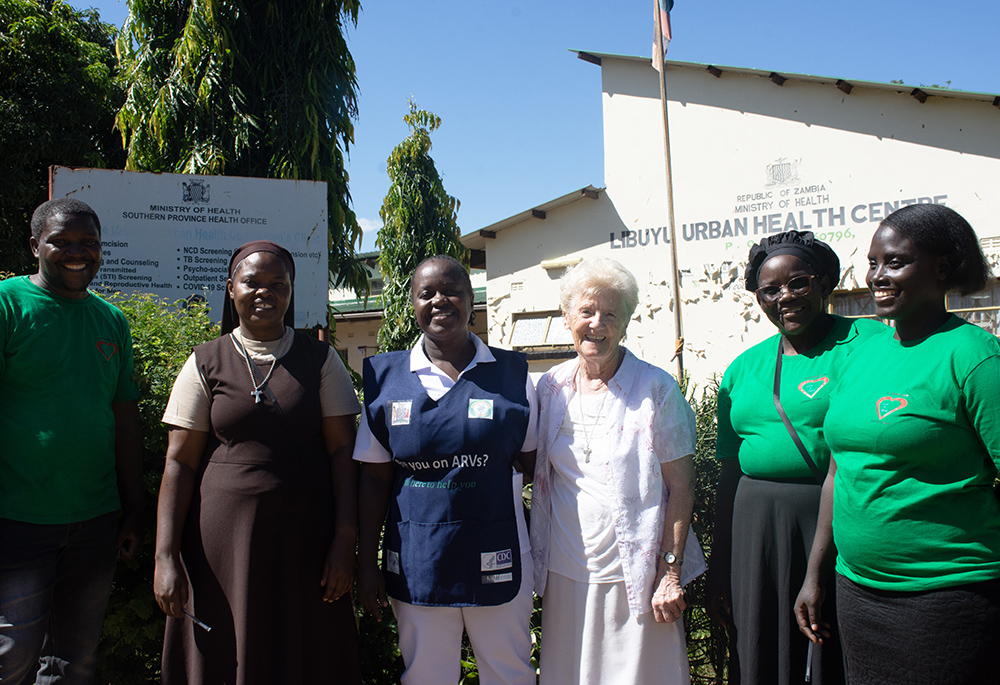
Sr. Mary Courtney is pictured with a group of volunteers from the St. Francis Community Integrated Care Programme in Livingstone, Zambia. (Derrick Silimina)
Who inspired you to become a sister?
I was inspired by St. Francis of Assisi. As a young girl, I desired to be a missionary in Africa and to become a Franciscan. My nursing profession aligns well with my missionary work, which entails the Franciscan charism of love, service, honesty, transparency, dignity and respect for creation.
How does your charism align with your missionary work?
Our organization upholds values such as love and service, honesty [transparency] and respect for human dignity, all aimed at promoting peace and justice and strengthening friendship with all creation.
By believing in the philosophy of "working with" rather than "working for" the people, our organization empowers men and women from within the communities who have always been the backbone of our program activities. These "supporters" are the primary contact with the needy and marginalized. They are the ones who identify, assess and enter the clients to receive services.
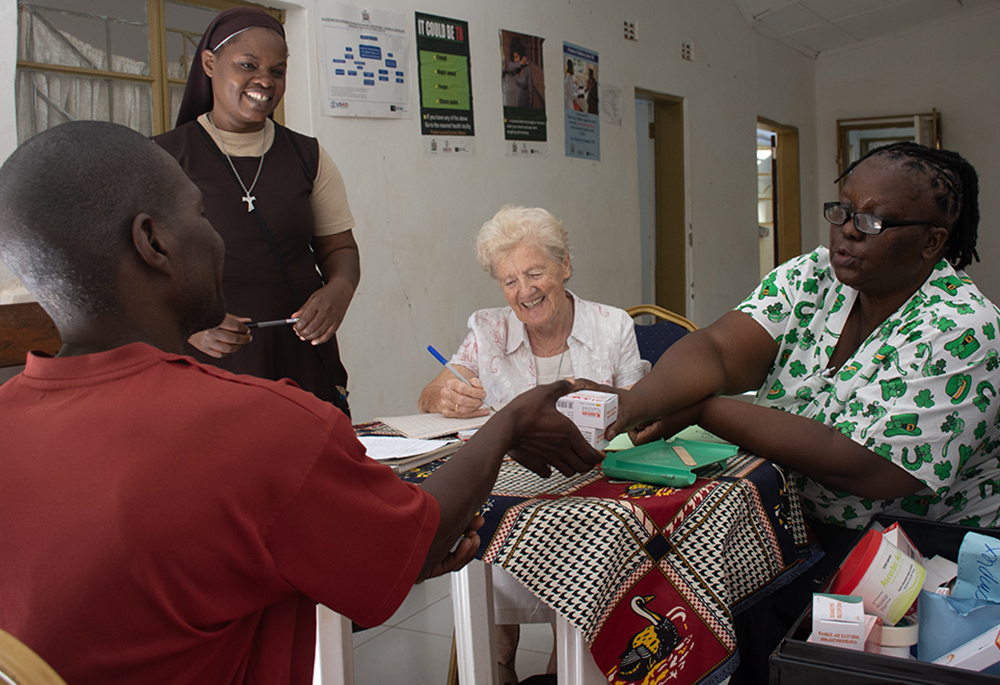
Sr. Mary Courtney interacts with patients receiving medication from the St. Francis Community Integrated Care Programme in Livingstone, Zambia. (Derrick Silimina)
In response to HIV/AIDS, how did you manage to establish counseling, palliative services and home-based care, as well as behavioral programs?
We built a good rapport with the clients and other stakeholders, including [the] government at [the] district level, and it was and has been easy for the organization to implement home-based care, behavioral programs in schools, economic empowerment through savings and internal lending communities, and mental health programs for adolescents.
Through lobbying meetings with the district health office, we moved our mental health clinics from under trees where we used to conduct them to the government clinics. Another point is the correct use of resources, especially finances, which enabled the organization to gain donor confidence.
How many patients have benefited from your humanitarian work?
More than 15,000 people have benefited directly from the program, and more than 40,000 indirect beneficiaries through various activities, including radio programs.
Advertisement
Tell us about your recent honor from Zambia's President Hakainde Hichilema: the Presidential Insignia for Meritorious Achievement.
It is an honor and reflects tireless and fruitful ministry to vulnerable groups here in Livingstone. I did not attain it alone and owe it to the staff, care supporters, fellow sisters and everyone for supporting the organization from its inception.
What are your key challenges, and how do you address them?
Funding is a challenge. The organization has continued writing proposals to potential donors, especially for expensive psychiatric medication and supplements. The organization continues to hold advocacy meetings with the Ministry of Health so that the government will consider budgeting for medicines for people living with mental health challenges on a larger scale. Through the board of management, some fundraising ventures have been held, and profit is put in a fixed deposit account for future use.
I thank all our benefactors, families and friends for the unceasing support the organization has received to help the vulnerable in Livingstone.
